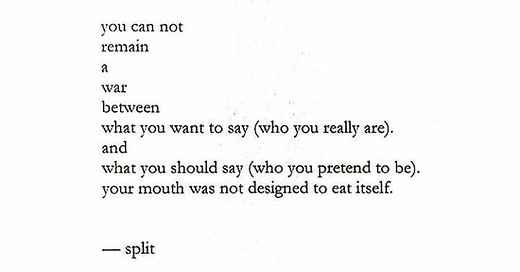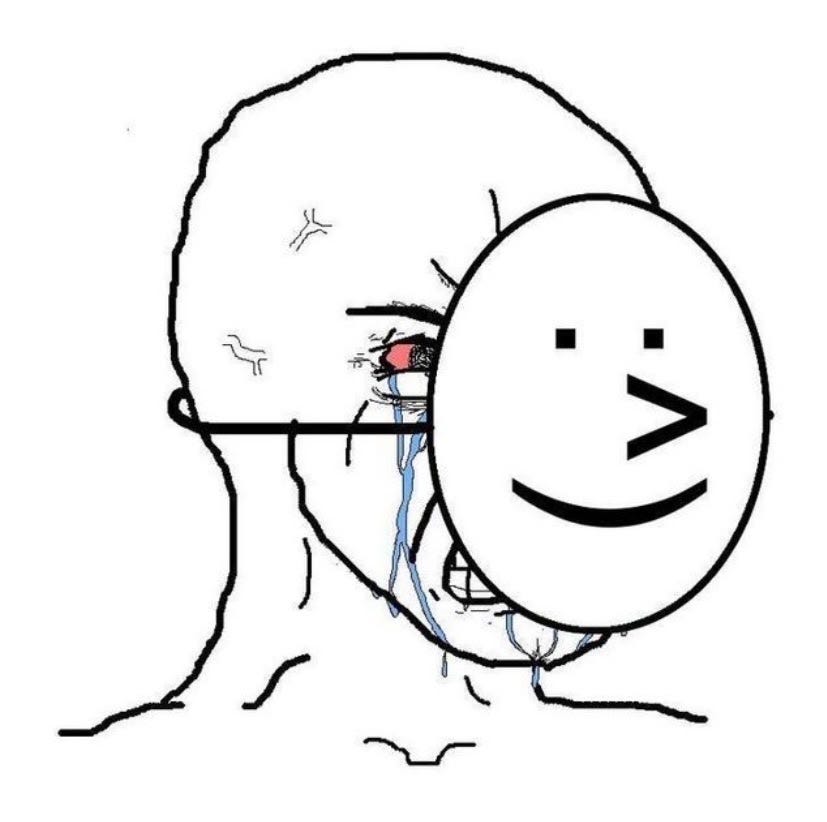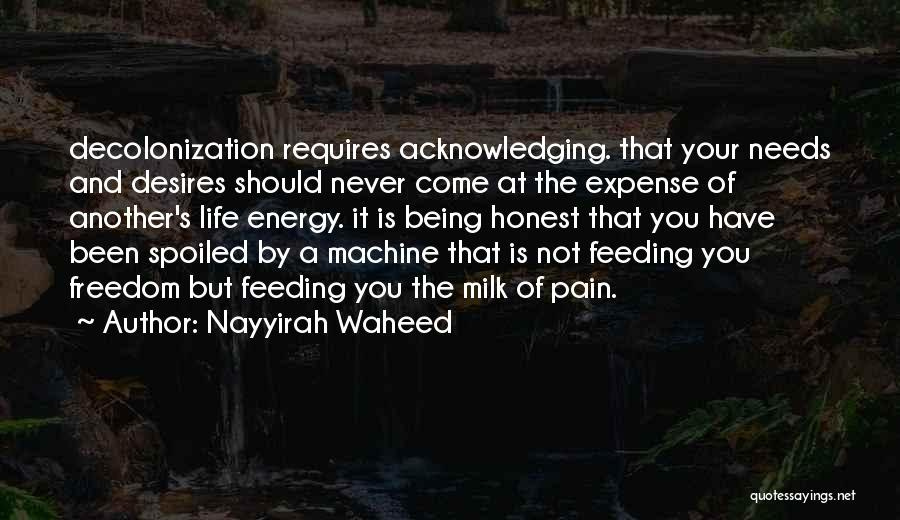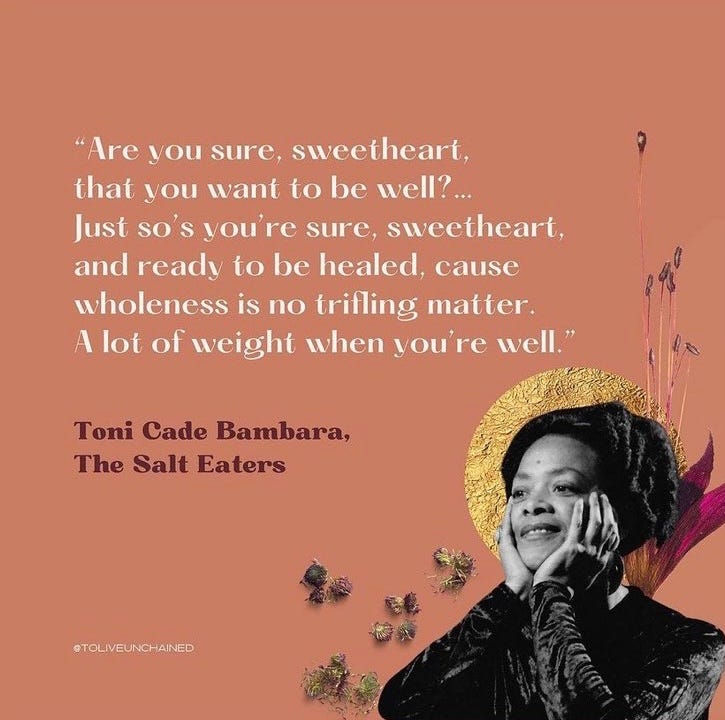Last week’s letter, on childhood and justice, sets up the reflections shared in today’s letter on honesty. So much of our life teeters between our past, the present, and our dreams towards our future. This movement between all realms can be exhausting at times, but I think, through chapter 3 of All About Love, we’ll be able to gather insight on how to reconcile all of our parts into wholly becoming love.
I came across the poem above by Nayyirah Waheed and found it fitting for what will be shared here.
Something New
Chapter 4 of the “year with bell hooks” project goes out next Saturday evening. I’m opening a few slots to have readers (that’s you!) share thoughts/reflections to add to our upcoming letters. If, after reading, something sparked your mind or introduced a new way of thinking, and you would like to share (anonymously or not!) – use the button below to submit.
Let’s get started.
Lying Builds our False Self
The message given males is that to be honest is to be ‘soft.’ The ability to be dishonest and indifferent to the consequences makes a male hard, separates the men from the boys.
John Stoltenberg’s book The End of Manhood: A Book for Men of Conscience analyzes the extent to which the masculine identity offered men as the ideal in patriarchal culture is one that requires all males to invent and invest in a false self.
From the moment little boys are taught they should not cry or express hurt, feelings of loneliness, or pain, that they must be tough, they are learning how to mask true feelings.
All About Love - p. 38
However many times my brothers and I have sent this meme while texting each other are neither here nor there 🥴 when thinking about how hooks describes lying as a tool that distorts the self and stifles our fullest and true emotions in order to keep up and look the part, this image describes it all.
The inventing and investing in a false self in order to survive this patriarchal culture immediately takes us back to our introduction in chapter one to cathexis - the process of placing mental or emotional energy into a person, object, or idea.
If,
Lots of people learn how to lie in childhood.
All About Love - pg. 34
Then, this (ongoing) experience only creates the dynamic where we grow up mastering people-pleasing, two-sidedness, and participating in a daily dismissal of the uniqueness that makes us who we are. Our false self emerges from this lack of understanding about love or having been abused (in the name of love) or being told to tell the truth at all times (yet being punished as children for it and seeing the adults not abide by it).
If
Usually they (children) begin to lie to avoid punishment or to avoid disappointing or hurting an adult.
All About Love - pg. 34
Then, lying “provides” “safety.” It makes sense why we would then (falsely) attach feelings of love and care in places profoundly dysfunctional, dishonest, and destructive to all people at its core. This is only chapter three of this love journey, but I wonder if this pursuit of honesty, honest-living, and truth-telling is frightening to others? Because if + when we put this to practice, it’s a commitment to return to + build what may not be entirely constructed yet — our true selves.
Return to me? But, who am I?
I think about this because if lying is what I/we have learned during our early formative years, what is true and what is true about who I am and who we all are?
That is why in topics like these, we can’t dismiss our childhoods.
We learn about love in childhood. Whether our homes are happy or troubled, our families functional or dysfunctional, it’s the original school of love.
All About Love - pg. 17
All our collective calls towards justice must center on children/childhood. It also looks like in present times, to treat our children — related or not, with real love, advocacy, and looking inward to our inner-child — even our inner-teenager / young-adult.
I’m learning that the journey towards love and love wholly requires that emotional masking (not physical — please mask up!) only stunts our ability, to be honest, and actualize this love.
The Language of Lies
Victor Seidler stresses: ‘when we learn to use language as boys, we very quickly learn how to conceal ourselves through language. We learn to ‘master’ language so that we can control the world around us….Even though we learn to blame others for our unhappiness and misery in relationships we also know at some unspoken level how our masculinity has been limited and injured as we touch the hurt and pain of realizing how little we seem to feel about anything.’
To embrace patriarchy, they must actively surrender the longing to love.
All About Love - pg. 39
Again, the poetic words of Nayyirah Waheed sync right with hooks guidance towards honesty. So much of this lying, shame, dishonesty and more, come about as side effects from coloniality.
Ok, even typing that, I was like “Chi, where are you going with this.” Alright, stay with me for a quick minute.
Frantz Fanon in Black Skins, White Masks, speaks about the psychology of colonialism. I shared earlier about how hooks talked about the shaping of lying and how that create the false self. The id, ego, super-ego, inner-child, wounded-self, shadow-self, all of those entites all fit here.
All of these tie to the commitment to love, which is
An act of will - namely, both an intention and an action. The working definition for love is partly from Erich Fromm (The Road Less Traveled), where love is “the will to extend one’s self for the purpose of nurturing one’s own or another’s spiritual growth … love is as love does. Will also implies choice. We do not have to love. We choose to love.
To truly love, we must learn to mix various ingredients - care, affection, recognition, respect, commitment, and trust, as well as honest and open communication.
All About Love - pgs. 4-5
So, back to Fanon. On page 21 he shares that
To speak a language is to appropriate its world and culture.
If this is the case, then there must be a decolonizing not only in the way that we love and see love but in our language too. Language goes beyond shared words (though yes, it is the core). Language shapes how we identify ourselves and to whom we feel connected — past, present, or future. If this is a love project, learning from hooks on how to detach ourselves from a culture that props itself on whiteheteropatriarchy, then language and culture fit right into what needs to be looked at further.
What does it mean to shape yourself through the eyes and language of the oppressor? What does it mean for patriarchy to disguise itself as a system that only benefits men and harms all else when the reality is that patriarchy harms us all?
I say this as I realize I have understood myself through the English language, but I cannot write or read Igbo. There are still parts of me unknown as I do not know or understand my home language to describe it. But this isn’t to say that the journey towards decoloniality is impossible - it is just a daily process. A repetitive recognition and a continued belief for healing. This is a call to a love that is honest and full (emotionally, mentally, spiritually, and more). It means recognizing the harms done by the lasting effects of coloniality and anti-blackness, the whiteheteropatriarchy, must die so that our true selves will emerge.
And this death-rebirth towards wellness is no trifling matter, as Toni Cade Bambara wrote. But it is necessary. And this detachment from what is false is the only way true love can really take root within us.
Until next week, and, with love.
ICYMI
Chapter 4 of the “year with bell hooks” project goes out next Saturday evening. I’m opening a few slots to have readers (that’s you!) share thoughts/reflections to add to our upcoming letters. If, after reading, something sparked your mind or introduced a new way of thinking, and you would like to share (anonymously or not!) – use the button below to submit.







